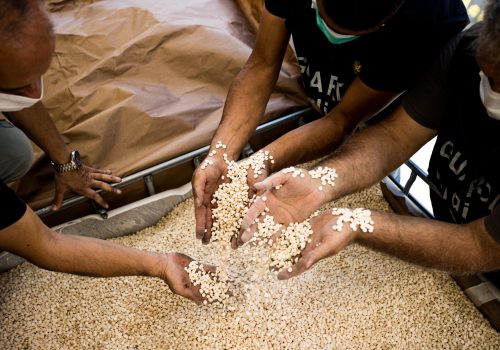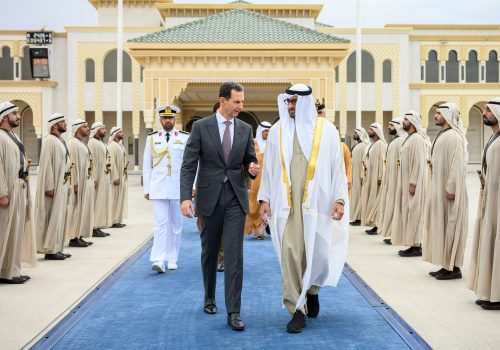The uprising in Sweida will continue until the regime changes in Syria
Since August 20, protests and a general strike in the southern governorate of Sweida, which has a population of approximately 770,000, have persisted. Protesters have closed the headquarters of the Baath Party and removed pictures of dictator Bashar al-Assad from the streets and buildings of the city.
These demonstrations call for a change in the Syrian regime and the full implementation of United Nations Security Council (UNSC) Resolution 2254, which put forth a road map for the peace process in Syria, including forming a transitional governing body with full powers. Protesters also advocate for political, civil, and human rights for all Syrians: freedom, dignity, justice, equality, the release of detainees, and the ability to live decently, especially given the deteriorating economic situation that has become unbearable.
The regime has implemented failed economic policies and has been unable to secure the needs of its citizens. Additionally, the Syrian people believe that the regime is not interested in integrating a political solution that would lead to a new reality for Syrians—one that would allow for reconstruction and the lifting of sanctions. This conviction is bolstered by the fact that the regime is currently granting contracts that allow Russia and Iran to access the country’s resources. Meanwhile, the Syrian people are struggling.
Additionally, the Assad regime and ruling class are drowning in funds looted from the people through a deep network of corruption, which is compounded by the destruction of infrastructure since the beginning of severe military repression in 2011. The regime has displaced nearly half of the Syrian population, killed hundreds of thousands, and detained over a hundred thousand—many of whom have been tortured to death. Despite this dark history looming overhead, Syrians still felt compelled to take to the streets in Sweida to demand regime change: the only practical solution to ending the humanitarian catastrophe they face.
It may be unexpected to witness this scene after all the suppression and war crimes committed by the Assad regime in Syria. However, it signifies that the desire for change in Syria still exists within the Syrian people.
Sweida, a predominantly Druze-majority province, has witnessed scattered and continuous protests throughout the previous years led by its intellectual elite. Nonetheless, the demonstrations were never as widespread and inclusive as today. These protests have been joined by women’s movements, religious figures, employees, urban and rural residents, intellectuals, and opposition politicians.
The protests have also occurred in other parts of Syria, including Daraa, Idlib, Raqqa, Deir ez-Zor, and Aleppo. Voices of opposition from the Syrian coast—the heart of the Syrian regime’s stronghold—are growing louder, openly calling for change and the departure of the head of the regime: Assad. Moreover, new revolutionary groups, like the Tenth of August Movement, are also forming.
This uprising in Sweida met with media incitement by the regime against the people of Sweida, accusing them of betrayal and profiteering, The regime used this media incitement against demonstrators to create division between Syrians and create a reason to arrest and maybe attack them in the future, as he did in other areas. The government also employed arrests and suppression in other provinces. The people of Sweida—those at home and in the diaspora—are concerned that the regime might use its affiliated militias or groups, such as Lebanese Hezbollah and the Islamic Revolutionary Guard Corps (IRGC), to suppress this movement—just as it has done in other provinces in the past.
The current protests in Sweida come at a sensitive and critical phase after the hopes of Syrians in the West and Arab countries were lost, especially following the normalization of the Assad regime with Arab countries in May.
Nevertheless, the Assad regime has shown no interest in being involved in the Arab initiative or any political solution. The regime has not taken any trust-building steps, responded to the effects of UNSC Resolution 2254, nor committed to the political process. On the contrary, in his recent interview with Sky News Arabia on August 9, Assad appeared indifferent to the reckless policies that have led the country to disintegration and economic and social collapse.
Despite over a decade of carnage, damage, and destruction caused by his rule, during the interview, Assad attempted to falsify history by claiming that the number of Syrians who protested against him did not exceed a hundred thousand. This is a grand historical distortion. Detainees exceed a hundred thousand and protests involving hundreds of thousands have occurred across all Syrian provinces. A few days after his remarks, the people of Sweida—not just the Druze, but Bedouins and others—united to tell him to leave.
Today, Arab countries bear a historic responsibility to reconsider their calculations. The scene in Sweida proves that the only acceptable solution to achieve peace in Syria is by fully implementing political transition and avoiding normalization with the Assad regime. This approach will fully address the refugee problem and security issues by confronting the captagon manufacturers, distributors, and smugglers directly linked to the regime, Hezbollah, and militias in Syria.
As long as the Assad regime is in power, it will not sever its alliance with Tehran. As its history and behavior show, it will remain a rogue regime in the region, unconcerned with the security of neighboring countries or global peace. Changing the regime in Syria by enforcing 2254 and starting the transitional process, as demanded by the protesters, will begin the process of reconstruction and revitalize the economy, leading to stability in the country and the region as a result. With these points in mind, Arab governments should remember that supporting the Syrian regime will not bring stability to the region. Instead, the crisis will perpetuate and the Syrian people will pay the price with their blood and livelihoods.
The international community also bears responsibility for the current state in Syria. It has not seriously addressed the regime’s crimes, successfully enforced a political solution, nor implemented UN resolutions. The Assad regime has repeatedly used chemical weapons, practiced systematic torture, extrajudicial killings, forced displacement, enforced disappearances, and bombed civilians, hospitals, schools, and public markets. No serious measures have been taken to implement Resolution 2254. The political solution has been diluted by focusing solely on the constitution—a path that has been dead since birth—and no agreement has been reached on a timetable for it.
The Syrian people pay the price of oppression, bloodshed, and displacement. The root cause of the suffering endured by Syrians is being ignored, which is the ongoing rule of the Assad regime. The international policy that unleashed Russia in Syria is responsible for Moscow’s continued audacity in Syria and globally, as demonstrated by its actions in Ukraine. History shows that disregarding war criminals and rogue behavior will inevitably lead to the persistence of their crimes, as well as the expansion and escalation of them.
The Syrian men, women, and children of Sweida and all provinces are taking to the streets, proclaiming with their voices that the people of Syria deserve lasting peace, freedom, dignity, and decent living conditions. They deserve liberation from the tyrannical Assad regime and the provision of the rights stipulated by the Universal Declaration of Human Rights. They earnestly demand serious engagement and the full implementation of UNSC Resolution 2254 to achieve political change in Syria and secure political, civil, and human rights, aiming for a homeland where citizenship and justice are realized for all Syrians without discrimination.
This is the cry of an oppressed people whom the world has let down, abandoned, and disregarded since 2011. The protests are a last flicker of hope for the Syrian people. They are an ethical test for the world in regard to pursuing a comprehensive and sustainable political solution that will bring about genuine change in Syria. Can the world hear the people of Syria?
Rima Flihan is a writer, feminist, and human rights activist. Follow her on X: @rimagf75.
Further reading
Thu, Aug 24, 2023
No quick fixes for the Middle East’s captagon crisis
MENASource By
Counter-captagon policies should look further ahead and deeper into the causes of the demand in the first place.
Thu, Apr 6, 2023
Arab states are normalizing with the Assad regime. This is the Middle East’s 1936 moment.
MENASource By
Now diplomatic relations are set to be restored between Syria and two behemoths of the Arab League: Egypt and Saudi Arabia, who are the holders of the all-important veto on Assad’s return to regional respectability.
Fri, Jun 9, 2023
Assad is appointing new military officials to escape sanctions on Syria
MENASource By
Of the thirty Syrian army and security officers in new leadership positions, only two are blacklisted. This indicates a significant gap.
Image: Hundreds of Syrians in the northwest city of A'zaz gathered today in a demonstration expressing their support for the protests taking place in the Sweida Governorate and southern Syria. These protests denounce President Bashar al-Assad's regime and call for its overthrow on August 25, 2023. (Photo by Rami Alsayed/NurPhoto)


